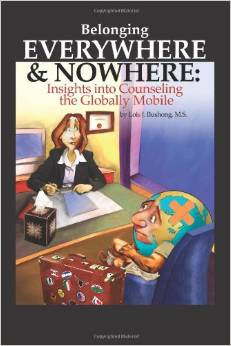“I found a counsellor who wasn’t particularly helpful and struggled for a year with her. I’ve found another counsellor and my husband and I are doing couples counselling, which has been very helpful for both of us to face the feelings about the move and our separate unhappiness about being here. It’s a long road from here, but it’s improving” – “V”.
In last week’s blog I looked at how people had helped themselves to tackle their depression. Top of the list was the thing that I will look at this week – which is seeking the help of a professional. Which isn’t necessarily all that straightforward when you are living in a foreign location – especially one that is very remote and not necessarily an expat stronghold. So who did people turn to when they needed that help? And what was the general experience of seeking the assistance of a professional?
As always, it was a very mixed bag. The split between those who said yes they did seek professional help and those that said no was roughly about 50/50 – although if you include those who plan to do so at some point the figures go up in favour of the yes’s.
Why did people NOT seek professional help?
To start to look at why people have sought out the help of a specialist and how this has helped them, I wanted to first look at why people haven’t. This gives some idea of the problems faced by expats trying to get help in their overseas locations.
Many of course simply gave a straightforeward answer – no, they didn’t. No explanation given – they just didn’t. And others gave the same sort of reasons that anyone, anywhere might give – reasons not associated with being an expat but with just feeling vulnerable and in a difficult place: “I felt I had it handled”, “I never had the guts to call”, “I couldn’t get an appointment and gave up trying”.
However other reasons were more specific to being an expat – “the only specialist I could find was geographically unavailable”, “in our last place not a single person respects confidentiality”, and a few people mentioned the difficulty of finding someone with enough understanding of the expat experience to really be able to help.
But for those that did – how helpful was it?
“I went to a counsellor on GP recommendation when in Dublin. First time I had been to a mental health specialist. In 2005 approached a coach in the UK (I was in the Netherlands) by phone and email to help with a decision for a future expat trip and found myself working out things I’d been holding on to for years. It began a process of self-discovery and a new career for me” – Nicola, who went on to train as an expat coach herself.
Almost everyone seemed to think that the professional assistance they did get was helpful – ranging from a simple “it did help” to “it helped immensely”. In between were some of these comments:
“I saw a therapist in the UK for several months and that, paired with being in a familiar environment with friends and family was just what I needed” – Catherine.
“In conjunction with therapy I made a lot of changes to my lifestyle….all of this helped pretty quickly” – Anne.
There were also some, to be fair, who said that seeking help from a specialist didn’t really help them. However, these were definitely outnumbered by those who said it did and it is always worth at least trying this route if you feel you need it.
Who did people seek help from?
“During my first expat experience in Indonesia I reached out for my psychologist in Australia, via email and obtained a certain amount of support that way. I was lucky enough to have a very supportive psychologist who would do that for me although I imagine it is not very common. It certainly helped knowing that she was there and would help if I asked, even if I didn’t use it. it was simply nice to know that someone who knew me very well could make decisions in an emergency that I knew I may not be able to make if my depression worsened to an extent that I was in a dangerous place”. Robyn.
So where did people find this help? What sort of professionals were they – and where or how did they find them?
Again, this was a really mixed result. Here are the words used in my survey to describe the professionals used by respondents: counsellor, therapist, psychiatrist, medical professional, OB-GYN, social worker, psychologist, family doctor, GP, life coach. So quite a range – and this is an area you may need to explore. But certainly counsellor and therapist were the words that came up most often.
Many people simply sought someone out locally, wherever they happened to be (whether in their host country or back home after repatriation). But more and more people are turning to online counselling as a great alternative to seeking face-to-face help. In particular, these therapists often have a first-hand knowledge of expat life and have almost certainly worked with many other expat clients – thus giving them an edge over those who may not have had the same sort of insight into our world. Of course local professionals can also offer an excellent service and it isn’t always necessary that they have this specialist expat knowledge – especially in cases where your depression is not a direct result of your expat experience.
Finally, as was the case of Robyn whose quote starts this section, some people were able to carry on using a therapist they were already in touch with from their home or another expat location. With the availability of the internet, Skype etc these days this is always a solution worth exploring if you do already have someone you have been working with.

And what kind of therapy did people get?
“I wasn’t able to dig myself out of this on my own. Healing didn’t begin until I started seeing a therapist who referred me to a psychiatrist who together worked with me for about six years before they found the correct types and dosages of meds, coupled with weekly therapy.” – Anon.
Just like with any kind of counselling help, a variety of assistance was given. Some started on anti-depressant medication, others just used talking therapy. One survey respondent was given the herbal remedy St John’s Wort (“which helped for a while…but not now”), another was emailed a list of coping strategies from her online counsellor. A couple of people said they were introduced to Cognitive Behavioural Therapy (CBT) as the way to help them cope.
Importantly, almost everyone did say that they used professional counselling alongside self-help methods. It seems that it is the combination of the two that has been proved to be most successful – although often what people need is some specialist help to get them started. When you are so low that even getting out of bed is hard, it can seem like too big a mountain to climb to get out and meet people, do some exercise, find a new hobby…..
How to find help
I can’t personally endorse any counsellor as I have not used them. However I would like to mention a few experts who I have at least been in contact with since I started this blog and can confirm them as empathetic figures and with a good knowledge of expat life. First of all is expat mental health expert Anita Columbara, who has been helping me by overseeing this series. Then there is Vivian Chinoa who featured on this blog last year and who runs the Expat Nest website and counselling service. Finally is Olivia Charlet, who has also been featured on this site and who runs a coaching business. All three offer something very different – a good example of how many different options there are out there.
In addition, here is an interesting article about Finding a Therapist while living abroad written by seasoned expat Robin Pascoe and including an interview with a Seattle-based expat counsellor.
Finally, a very helpful International Therapist Directory which is an “an online listing of professional mental health therapists familiar with the Third Culture Kid and international expatriate experiences.”
Photo credit: Counselling – Cushing Memorial Library
To read all the posts on depression in this series please visit the expat depression section of my blog here.








